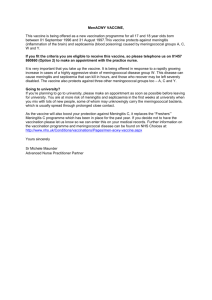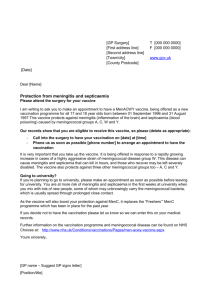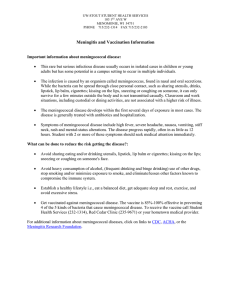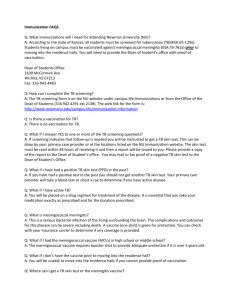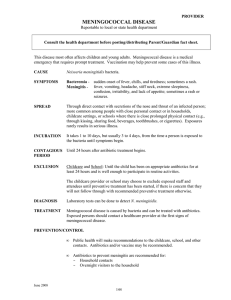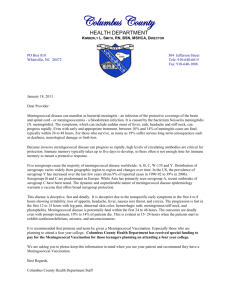Meningococcal Vaccine and Disease Information Vaccination
advertisement
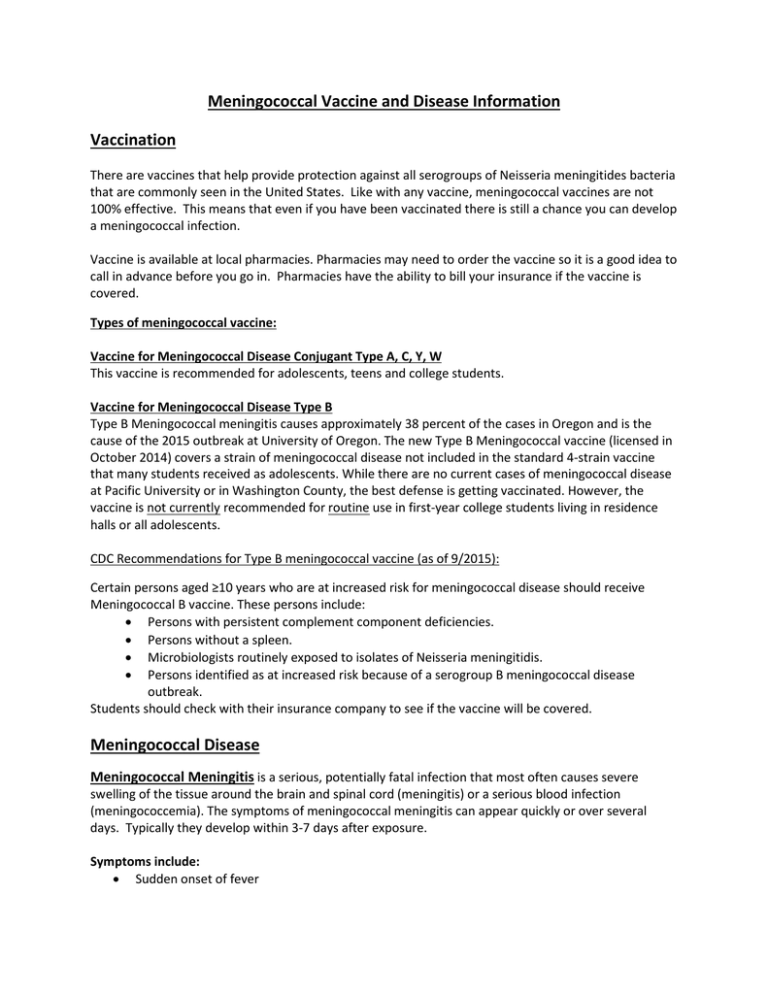
Meningococcal Vaccine and Disease Information Vaccination There are vaccines that help provide protection against all serogroups of Neisseria meningitides bacteria that are commonly seen in the United States. Like with any vaccine, meningococcal vaccines are not 100% effective. This means that even if you have been vaccinated there is still a chance you can develop a meningococcal infection. Vaccine is available at local pharmacies. Pharmacies may need to order the vaccine so it is a good idea to call in advance before you go in. Pharmacies have the ability to bill your insurance if the vaccine is covered. Types of meningococcal vaccine: Vaccine for Meningococcal Disease Conjugant Type A, C, Y, W This vaccine is recommended for adolescents, teens and college students. Vaccine for Meningococcal Disease Type B Type B Meningococcal meningitis causes approximately 38 percent of the cases in Oregon and is the cause of the 2015 outbreak at University of Oregon. The new Type B Meningococcal vaccine (licensed in October 2014) covers a strain of meningococcal disease not included in the standard 4-strain vaccine that many students received as adolescents. While there are no current cases of meningococcal disease at Pacific University or in Washington County, the best defense is getting vaccinated. However, the vaccine is not currently recommended for routine use in first-year college students living in residence halls or all adolescents. CDC Recommendations for Type B meningococcal vaccine (as of 9/2015): Certain persons aged ≥10 years who are at increased risk for meningococcal disease should receive Meningococcal B vaccine. These persons include: • Persons with persistent complement component deficiencies. • Persons without a spleen. • Microbiologists routinely exposed to isolates of Neisseria meningitidis. • Persons identified as at increased risk because of a serogroup B meningococcal disease outbreak. Students should check with their insurance company to see if the vaccine will be covered. Meningococcal Disease Meningococcal Meningitis is a serious, potentially fatal infection that most often causes severe swelling of the tissue around the brain and spinal cord (meningitis) or a serious blood infection (meningococcemia). The symptoms of meningococcal meningitis can appear quickly or over several days. Typically they develop within 3-7 days after exposure. Symptoms include: • Sudden onset of fever • Headache • Stiff neck Additional symptoms include: • Nausea • Vomiting • Photophobia (Increased symptom to light) • Altered mental status (confusion) Meningococcal Septicemia (also known as Meningococcemia): Another common outcome of meningococcal infection is bloodstream infection, either septicemia or bacteremia. When someone has meningococcal septicemia, the bacteria enter the bloodstream and multiply, damaging the walls of the blood vessels and causing bleeding into the skin and organs. Symptoms may include: • Fatigue • Vomiting • Cold hands and feet • Cold chills • Severe aches or pain in the muscles, joints, chest or abdomen • Rapid breathing • Diarrhea • In later stages, a dark purple rash If you think you have any of these symptoms, call a doctor right away. Meningococcal meningitis is very serious and can be fatal. In fatal cases, deaths can occur in as little as a few hours and in nonfatal cases permanent disabilities can occur.
